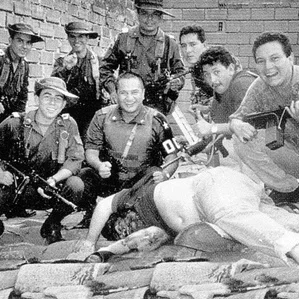The Burning Monk
June 11, 1963 - On this morning a procession of Buddhist monks and nuns marched to an intersection near the Cambodian embassy in Saigon. Three monks emerged from a car. One placed a cushion on the road and another carried a 5-gallon tank of gasoline. The third monk was Thích Quảng Đức, who had insisted that today was the day he would burn himself to death in protest of the Republic of Vietnam's persecution of Buddhists.
A letter he left behind read:
Before closing my eyes and moving towards the vision of the Buddha, I respectfully plead to President Ngo Dinh Diem to take a mind of compassion towards the people of the nation and implement religious equality to maintain the strength of the homeland eternally. I call the venerables, reverends, members of the sangha and the lay Buddhists to organize in solidarity to make sacrifices to protect Buddhism.
Thích Quảng Đức took a seat on the cushion and his colleague poured the gasoline over him. As he recited a prayer, Thích Quảng Đức lit a match and set himself ablaze.
Reporter David Halberstam was an eyewitness to the self-immolation:
Flames were coming from a human being; his body was slowly withering and shriveling up, his head blackening and charring. In the air was the smell of burning human flesh; human beings burn surprisingly quickly. Behind me I could hear the sobbing of the Vietnamese who were now gathering. I was too shocked to cry, too confused to take notes or ask questions, too bewildered to even think... As he burned he never moved a muscle, never uttered a sound, his outward composure in sharp contrast to the wailing people around him.
Photographer Malcolm Browne snapped a photo of the burning monk that would soon appear on the front pages of countless newspapers around the world.
After ten minutes the charred body crumpled forward. A crowd of monks moved in to collect his remains. Amazingly, Thích Quảng Đức's heart appeared to be unburned and it remained intact after a second cremation. Many Buddhists regard this as proof that Thích Quảng Đức had attained the ultimate enlightenment and become a true bodhisattva.
The high profile act raised international awareness to the plight of the Vietnamese Buddhists and ultimately served as a tipping point in resistance to the repressive regime of President Ngo Dinh Diem. Diem's sister in law famously dismissed the hoopla surrounding the burning monk by saying she would "clap hands at seeing another monk barbecue show."
Within 5 months Diem would be deposed and killed in a military coup.





